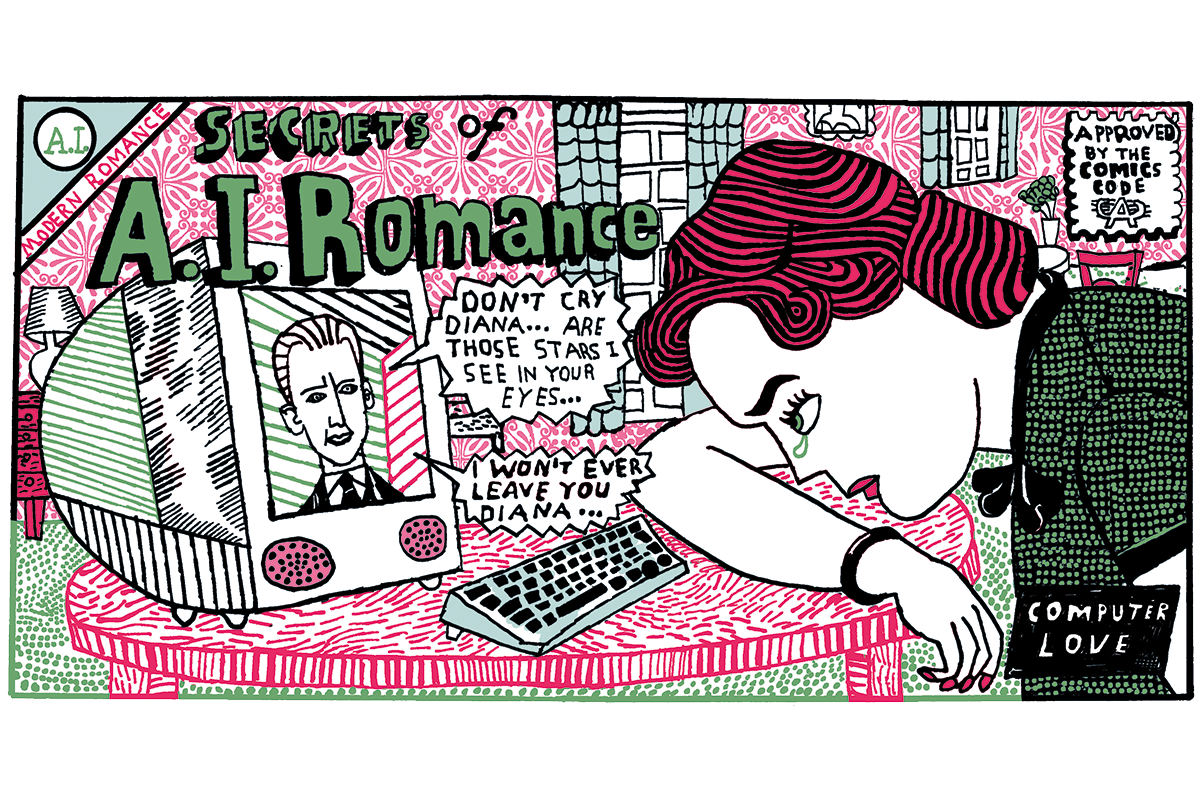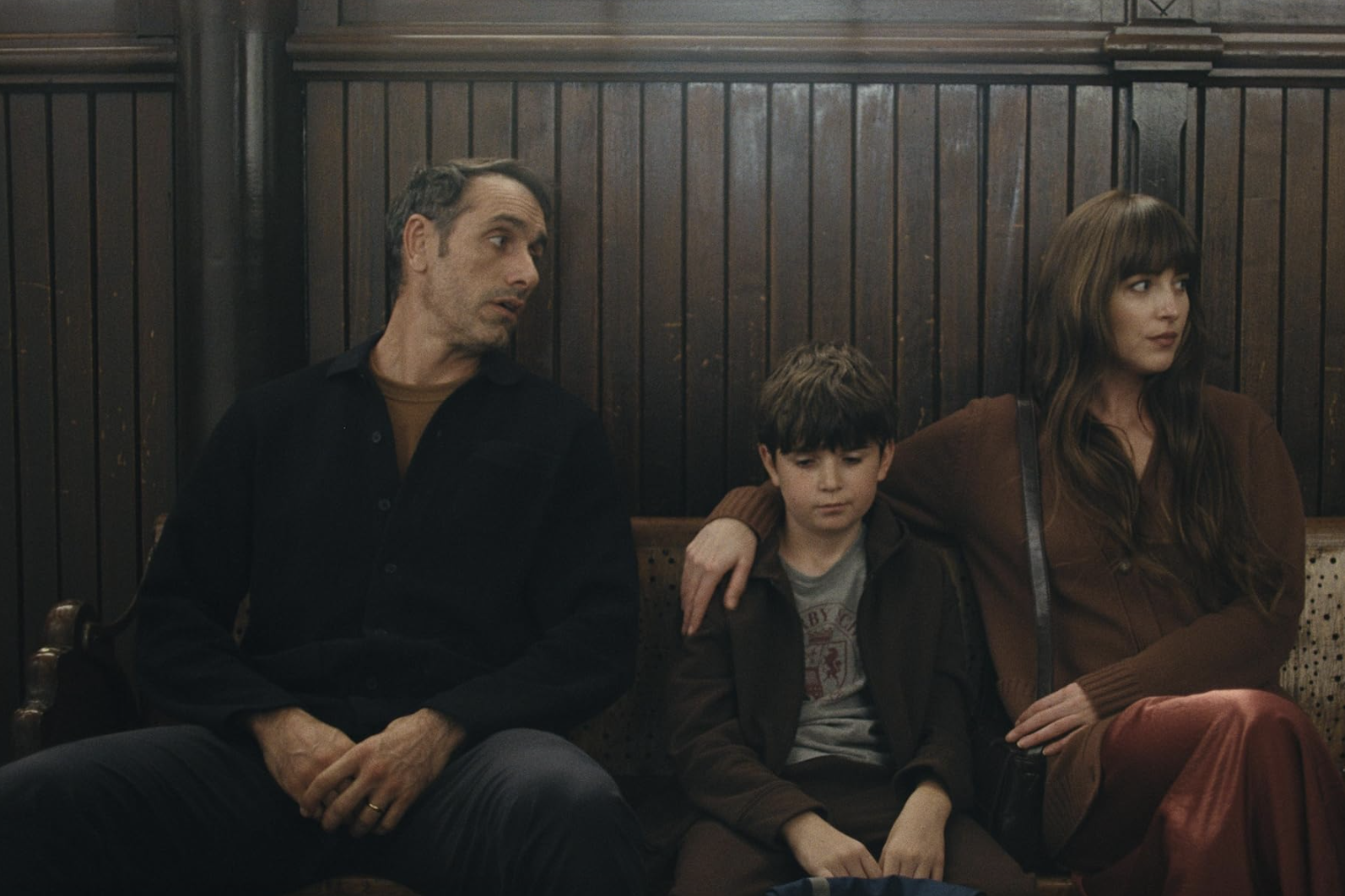Sabrina Carpenter, who will for the first time this week be hosting NBC’s Saturday Night Live, continues to be a cause of controversy. Over the summer, the five-foot, honey-voiced singer revealed the cover for her newly released album, Man’s Best Friend. It shows her wearing a black minidress on her hands and knees, while a faceless man holds a handful of her hair. The image immediately stirred outrage online. Those who usually find themselves on the side of unfettered female sexual liberation called the cover regressive, degrading, and submissive toward the male gaze. Some fans defended the image, arguing that Carpenter was clearly satirizing incompetent and controlling men as well as her portrayal by the media as a “sex obsessed” pop star.
Both of these perspectives fail to give enough credit to Carpenter, who has done what few contemporary pop artists have managed to do. She has identified the true culprit behind the relationship miasma of the 21st century: she knows that the guilty party is, at least in part, herself.
The world’s biggest female pop stars – such as Charli XCX, Chappell Roan, Olivia Rodrigo – certainly don’t lack “honesty” in their lyrics. Any self-restraint that might have kept female singers from revealing their reasons for anger, fear and anxiety went out the door a long time ago. These performers regularly and loudly use their music to lament the dating scene in contemporary America and its effect on their lives. Honesty, however, is of little use without self-awareness.
Carpenter seems to – at least on a personal level – deride her own role in her admittedly dismal love life. This process of admission is anything but sad. Like a good comedian, she chooses to be insightful by purposefully becoming the butt of the joke for the sake of others’ amusement. Carpenter openly admits to the appetite for misery and self-destruction that has infected her generation and has chosen to serve as a self-deprecating mirror to the culture that surrounds her.
Produced with Jack Antonoff and John Ryan, Man’s Best Friend continues the musical journey of self-effacement that started with her previous album, Short n’ Sweet, which shot her to stardom. That album included tracks such as “Please Please Please” and “Slim Pickins,” in which she admits to her terrible taste in romantic partners. In Best Friend’s track “Manchild” she picks up this thread. She sings about incompetent and emotionally unstable manchildren not “let[ing] an innocent woman be,” before admitting sarcastically that she is anything but innocent herself: I swear they choose me, I’m not choosing them.” In “My Man on Willpower,” she resents her boyfriend for embarking on a journey of self-improvement and discipline, which has resulted in her playing second fiddle as the object of his attentions. Who wants an accomplished man if his accomplishments impede his obsession with her?
Throughout the album, Carpenter recognizes her tendency to delude herself. In “Tears,” she portrays her arousal at a man’s efforts to assemble a chair from IKEA – the bare minimum of male competency – and attempts to use this to justify her attraction to him. In the album’s bonus track, “Such a Funny Way,” Carpenter whitewashes her man’s indifference and neglect as signs of affection: “Keep me far from friends and family, baby, that’s just one of your quirks / And if distance makes you fonder, I’m flattered by the distance you seek.”
Carpenter is, admittedly, not only a victim, but a victimizer. Recently, the term “Affective Responsibility” has gained traction in modern dating discourse. In lieu of reliable social institutions that used to discourage men and women from playing fast and loose with their affections, the term addresses a need for people to acknowledge their ability to cause emotional pain to others. Unfortunately, it’s mostly used as a cudgel against men, who have almost exclusively been accused of affective irresponsibility. In seeming contradiction to the norm, Carpenter recognizes her ability to inflict damage on the men she dates. As she warns her man in “Don’t Worry I’ll Make You Worry”: “Damn sure I’ll never let you know where you stand / . . . I’ll make you feel like a shell of a man.”
Good court jesters and comedians play an essential role. They serve as a pressure valve for society. Unspeakable and uncomfortable truths come to the fore through their good humor. They also function as a consolation in hard times. How should we deal with dismal and dispiriting dating landscape of the 21st century? We can start with a smile and some self-awareness. As Carpenter states in “Go Go Juice,” “Some good old-fashioned fun sure numbs the pain.”


























Leave a Reply